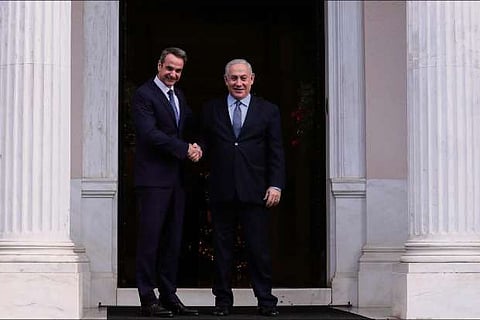

Athens
Greece, Cyprus and Israel on Thursday are expected to sign a deal to build a 1,900 km (1,180 mile) subsea pipeline to carry natural gas from the eastern Mediterranean’s rapidly developing gas industry to Europe.
Although Turkey opposes the project, the countries aim to reach a final investment decision by 2022 and have the pipeline completed by 2025.
European governments and Israel last year agreed to proceed with the so-called EastMed project, a $6 to 7 billion pipeline project that is expected initially to carry 10 billion cubic metres of gas per year from Israeli and Cypriot waters to the Greek island of Crete, on to the Greek mainland and into Europe’s gas network via Italy.
The energy ministers of Greece, Israel and Cyprus - Kostis Hatzidakis, Yuval Steinitz and Yiorgos Lakkotrypis - are expected to sign the final agreement on the pipeline at a ceremony in Athens on Thursday.
Greece has said the agreement will be concluded once Italy signs off too.
After meeting Greek Prime Minister Kyriakos Mitsotakis in Athens, Cypriot President Nicos Anastasiades said the deal sets the foundation for closer energy cooperation in the Middle East.
A number of large gas fields have been discovered in the eastern Mediterranean Levant Basin since 2009.
However, the region lacks significant oil and gas infrastructure and political relations between the countries - including Cyprus, Greece, Egypt, Israel, Lebanon and Syria - are strained on a number of fronts.
Last month a Turkish official said there was no need to build the EastMed pipeline because the trans-Anatolian pipeline already existed.
“Why should we bury 8 billion euros in the Mediterranean, through Turkey’s continental shelf and exclusive economic zone? If we do not allow that what will happen? So this is an issue and we need an original solution to oil and gas around Cyprus,” the official said.
The signing for the EastMed pipeline comes weeks after Turkey and Libya struck an accord on sea boundaries in the Mediterranean, a move which Greece, Cyprus and Israel opposed.
Analysts say that pact could present a barrier to the proposed pipeline which would have to cross the planned Turkey-Libya economic zone.
“If Turkey would be interested, the door is open,” Israel’s Energy Minister Yuval Steinitz told Reuters.
“We are ready to discuss some kind of cooperation, energy cooperation, also with the Turks. We are not against the Turks but we are very much in favour of the EastMed gas pipeline project,” he said.
The pipeline project is owned by IGI Poseidon, a joint venture between Greek gas firm DEPA and Italian energy group Edison.
DEPA on Thursday signed a letter of intent with Energean, a gas producer with a focus on the Eastern Mediterranean, to buy two billion cubic metres of gas annually from Energean’s gas fields off Israel via the planned pipeline.
Visit news.dtnext.in to explore our interactive epaper!
Download the DT Next app for more exciting features!
Click here for iOS
Click here for Android